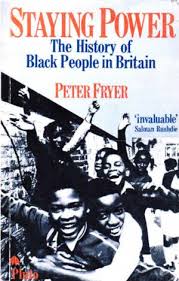Staying Power: the history of black people in Britain By PETER FRYER (London, Pluto Press, 1984). 632 pp. £9.95 paper
If black people insist that no white man or woman writes their history, it is because racism is so ingrained in white culture as to forbid the true writing of that history. White history itself is marked by the absence of black people — or, if they are present, they are portrayed as always be ing done to, never doing.
Peter Fryer goes a long way to redeem that dismal record. And he is able to do so precisely because his book, though a history of black people in Britain, is addressed, in the first place, to white people, telling them about their own racism and the resistance that black people have put up to it through the centuries — thereby making a substantial though largely forgotten contribution to the libertarian heritage of this country. In the process, Fryer retrieves for black people aspects of their own ‘lost’ history – from archives and museums and dusty old manuscripts — with such scrupulous scholarship, fastidious detail and fetching modesty that not even the ranks of black nationalism can ‘scarce forbear to cheer’. The 200 pages of appendices and notes alone are so rich in documentation, references to source material and suggestions for further reading as to provide a veritable arsenal of weaponry against white historiography.
Others have covered some of this ground before Fryer – Little and Walvin and Shyllon, for instance. But Little wrote early (1948) and only about Negroes in Britain, Walvin’s writing is historicist and white, and Shyllon, though worthy, is flat. Fryer’s canvas is not only vast, covering some 500 years of black history in Britain, but also three dimensional, examining and noting the interplay between slave (and colonial) exploitation and the rise of British capitalism, the engender ing of a racist ideology to justify and rationalise that exploitation and the resistance of black people (Asian, African, Afro-Caribbean) to that racism.
Or, rather, he is able to maintain that focus on the dynamics of racism and capitalism for most of the book – right up to 1948, in fact but begins to flag towards the end. And here I am not complaining that he has ‘purposely restricted the last thirty-five years to 27 pages because neither perspective’ nor “access to documents’ were as readily available to him — in fact, I applaud his reluctance to misplace himself in other people’s (on-going) struggles – but that when he comes closer to our own time, he ceases to be analytical, juxtaposing facts and events and protagonists rather than understanding them in terms of each other, dialectically. He notes, for instance, that post-war Britain was desperate for labour and cast about in the ex-colonies for workers and he appreciates that poverty and unemployment in these countries were ‘the chief legacy of imperial rule’. But he is unable to see the dialectical connection between the two within a continuum of capitalist exploitation – as encapsulated in the phrase of the Pakistani worker who, answering a sociologist researching a thesis on push and pull factors of immigration, declared: I am here because you were there.
On another occasion, Fryer, speaking of the disappointment and disillusionment of the 1950s settlers’, points out that ‘the West Indians in particular, had totally unrealistic expectations’. He puts this down, of course, to ‘the colonial education in which Britain was revered as the “mother country?”. But here again, he fails to under stand the impact of the slavery-colonialism continuum on the Afro Caribbean people. He fails to understand, that is, that slavery attempted to create a tabula rasa of the slave mind on which colonialism could then write its English script and scripture.
Fryer, in other words, is able to portray black reality, but he cannot apprehend it in its historical connections and continuities in such a way as to allow of changing that reality. But that is a task for black people in struggle. It is enough that Fryer has provided a base.

